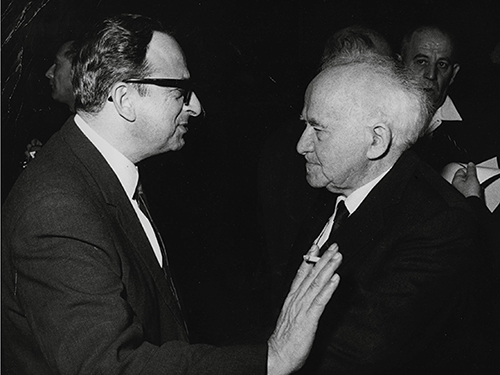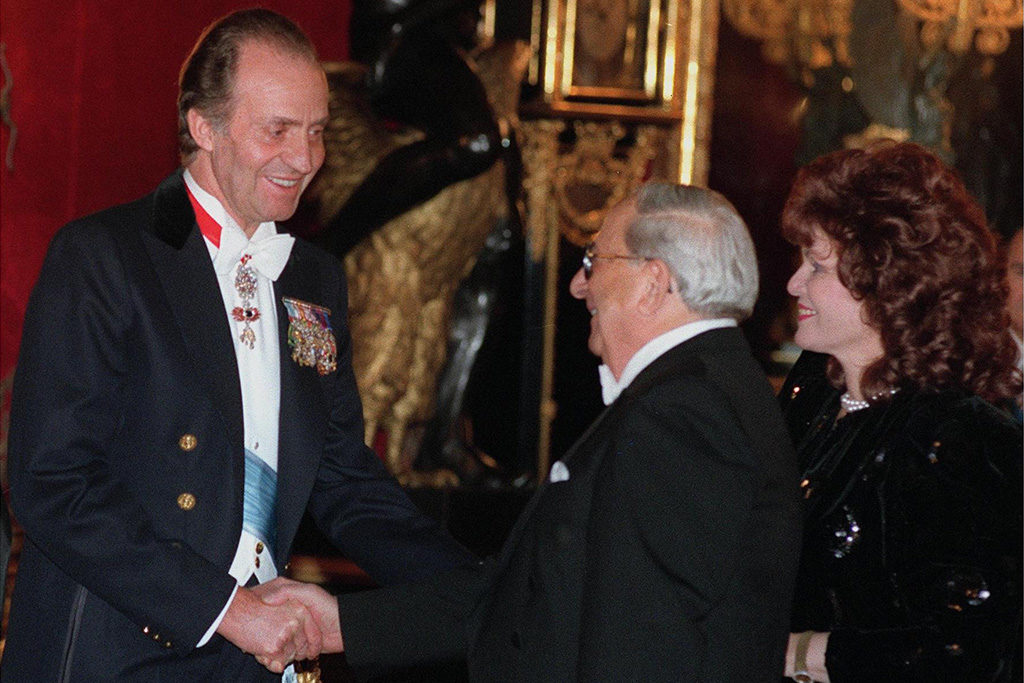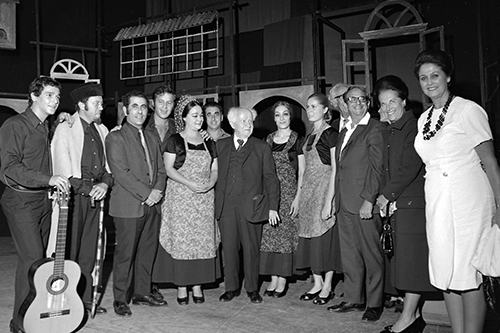Yitzhak Navon
Biography
“
This is the story of a man born in a momentous period in Israeli history who helped shape the country’s destiny.
Yitzhak Navon | Kol Haderekh
”
Who Was Yitzhak Navon?
Teacher and educator; diplomat; Member of Knesset and Minister of Culture and Education; the fifth President of Israel; Deputy Prime Minister; author and playwright; a man of peace
The Beginning
Yitzhak Navon was born on April 9, 1921, in Jerusalem, to a family that had lived in Jerusalem for many generations.
He attended the Hebrew University in Jerusalem, where he studied Pedagogy, Islamic Culture, Arabic, and Hebrew Literature, acquiring knowledge and skills that would prove invaluable during his long career.
Yitzhak Navon was a teacher and educator in Jerusalem until he joined the Haganah to head the organization’s Arab Intelligence Unit in Jerusalem. After the 1948 Arab–Israeli War, Navon was sent by the Ministry of Foreign Affairs on a diplomatic mission to Uruguay and Argentina. Upon his return to Israel, he was appointed political secretary to Minister of Foreign Affairs Moshe Sharet. In 1952, he was asked to head the bureau of Prime Minister David Ben-Gurion, whom he served for 11 years.
From 1963 to 1965, Navon headed the Department of Culture in the Ministry of Culture in Education and led a nationwide Hebrew literacy campaign aimed at adults. As part of this campaign, Navon founded a unit of soldier-teachers tasked with providing educational services to adults throughout Israel’s peripheral and development towns.
Member of Knesset
Navon served as a Member of Knesset from 1965 to 1978, when he was elected President. As a Member of Knesset, he served as Deputy Speaker of the Knesset and chaired the Foreign Affairs and Defense Committee. In 1972, during the 28th Zionist Congress, Navon was elected Chairman of the Zionist General Council. He maintained close relationships with Zionist and Jewish leaders worldwide and encouraged Jews abroad to immigrate to Israel. In 1984, he was elected to the Knesset a second time and served as Deputy Prime Minister and Minister of Culture and Education until 1990.

Copyright: Government Press Office
Fifth President of Israel
“It was a privilege to serve the Israeli people as President. I take with me countless experiences and meetings with Israelis from all walks of life, and I am grateful for the love and support that have been bestowed upon me.” (Yitzhak Navon, Kol Haderekh, p. 7)
On April 19, 1978, Navon was elected as Israel’s fifth President, an office he held until May of 1983. As President, Navon toured the country and visited Israel’s developing cities, periphery settlements, and minority villages to empower disadvantaged communities, inspire a sense of belonging and competence, and encourage young people to contribute to the development of their hometowns. Navon sought to bring together the people of Israel and worked ceaselessly to find mutual channels of communication between the country’s Arab and Jewish population and promote peace and coexistence with the Arab world. Navon’s exceptional ability to bridge differences and bring hearts and minds together was celebrated by then-President of Egypt Anwar Sadat, during Navon’s historic visit to Egypt in 1980. After Navon spoke to the Egyptian parliament in fluent Egyptian Arabic, Sadat concluded: “Navon has won the hearts of the Egyptian people“.

Copyright: Government Press Office
Minister of Culture and Education
From 1984 to 1990, Navon served as Minister of Culture and Education. In this capacity, Navon established four primary goals: values-based education; education to democracy and coexistence between secular and religious populations, Mizrahis and Ashkenazis, and Jews and Arabs; science- and technology-based education; and improving oral and written language skills.
Navon founded the National School Cultural Program with the aim of introducing Israel’s schoolchildren to a variety of artistic and cultural events; he instituted the tradition of high school trips to Poland; he introduced Arabic studies into the mandatory curriculum in public schools; he established the Eshkolot program for fostering connections among schools from different social segments, as well as the Children Teaching Children program, in which Arab and Jewish seventh-graders teach each other their respective languages and cultures; and he was instrumental in the founding of two NGOs, the Israel Association of Community Centers and Art for the People, to promote culture and bridge social gaps in development towns and disadvantaged neighborhoods.

Copyright: Government Press Office
Public Positions
In 1992, Navon chaired the public committee to commemorae the 500th anniversary of the Alhambra Decree. As Minister of Education, he signed a cultural agreement between Israel and Spain in Madrid. For his ongoing contribution in developing and promoting relations between Israel and Spain and for his efforts to preserve and revive the Ladino language, he was awarded the Grand Cross of the Order of Civil Merit by the King of Spain.
After his retirement from politics, Navon chaired a number of public bodies that reflected his personal values and beliefs. In addition to his role as Chairman of the Israeli National Authority for Ladino and Its Culture, Navon was given an Honorary Trustee Award by the Jerusalem Academy of Music and Dance and served as Chairman of Neot Kedumim, a biblical landscape reserve. Navon also served as President of the North African Jewish Heritage Center, Honorary Chairman of the Abraham Fund, which promotes coexistence between Jews and Arabs in Israel, a judge at the World Bible Quiz, President of the Haganah Membership Organization, and President of the Yad David Ben-Gurion Society.

Photography: Ya’akov Sa’ar, Government Press Office
Author and Playwright
Navon was a talented writer. His works include Holekh Birkida (Dance-Walking); Six Days and Seven Gates; Scroll of the Elders in the Western Wall; and other short stories. Navon penned two musicals – Romancero Sefardi and Bustan Sefardi – the latter of which was performed at Habima, Israel’s national theater, in 1970. The play was performed hundreds of times during the 1970s, and an updated version of the musical from 1998 is now part of Habima’s permanent repertoire.

Copyright: Mula and Haramati
Family Man
In 1963, Navon married Ofira Raz, a rehabilitation psychologist who worked with children with disabilities and advocated for women’s rights. They had two children, Na’ama and Erez. Ofira passed away in 1993 after a long struggle with cancer. In 2008, after a years-long partnership, Navon married Miri Shafir, a fashion and jewelry designer, painter, and writer. Miri stood by his side for 20 years, until his passing.
Yitzhak Navon died on the November 6, 2015, leaving behind more than seven decades of extensive public service.

Copyright: Government Press Office
Click here for more information:
Go to: Vision and Values | Timeline | My Navon

